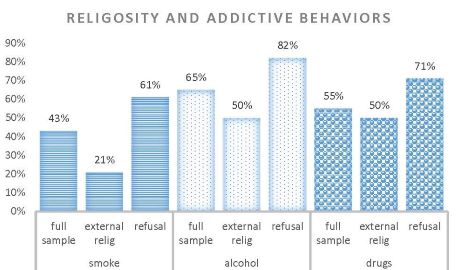Using data for young Romanians, a GLO Discussion Paper found that it is external religiosity that interacts with weaker addictive behaviors like smoking, drinking and using drugs.
GLO Discussion Paper No. 859, 2021
Religiosity, Smoking and Other Addictive Behaviors
by Roman, Monica & Zimmermann, Klaus F. & Plopeanu, Aurelian-Petruș
Now forthcoming OPEN ACCESS: Journal of Economics, Management and Religion (JEMAR), Vol. 2 (2022), 2250001.
Author Abstract: While under communism the identity-providing religion was suppressed, religiosity is strong today even among the youth in post-communist countries. This provides an appropriate background to investigate how external and internal religiosity relates to risky behaviors like smoking, drinking, and drugs among the young. This study shows that not religion as such or internal religiosity, but largely observable (external) religiosity prevents them from wallowing in those vices. While this is found strongly for both males and females, those females doubting or reflecting religion show a somewhat smaller risky activity.


GLO Discussion Papers are research and policy papers of the GLO Network which are widely circulated to encourage discussion. Provided in cooperation with EconStor, a service of the ZBW – Leibniz Information Centre for Economics, GLO Discussion Papers are among others listed in RePEc (see IDEAS, EconPapers). Complete list of all GLO DPs – downloadable for free.
The Global Labor Organization (GLO) is an independent, non-partisan and non-governmental organization that functions as an international network and virtual platform to stimulate global research, debate and collaboration.
Ends;

